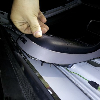So, youtube is such a wonderful source. This will basically sum up everything you really need to know:
http://www.youtube.com/watch?v=Zd33l8Gk2ZQ
Summary:
With the direct injection, fuel is being sprayed directly into the cylinders. It's more efficient and helps the engine run cooler. Thus, lower temperatures means that even with a lower octane rated fuel, the lower temperatures means that its less likely to auto ignite and cause knocking. Since the engine runs cooler, they then can raise the compression ratios higher so performance is improved, even if you're using a lower octane fuel.
The thing is though, this article does say this:
http://www.economist.com/blogs/babbage/2012/09/octane-ratings
"On the face of it, then, a motorist would seem ill-advised to use regular petrol in a car with a high-compression engine. That was certainly the case in the past. But cars today have sensors that listen carefully for the knocking sound, and instantly retard the ignition system when they detect that detonation is about to happen.
The delay in delivering the retarded spark allows the piston to start moving downward on its expansion stroke before the ignition actually occurs. That provides additional room in the cylinder head for the gases to expand and thereby reduce their damaging peak pressure—and so burn in a more controlled manner.
To sum up, if the car’s handbook says that premium petrol is “recommended” (rather than insisting it is “required”), then the engine will automatically adjust itself to run smoothly on a lower octane fuel. Because of the retarded ignition, the engine will, of course, produce less power, and have slightly higher fuel consumption. But the poorer fuel economy is likely to be outweighed by the savings at the pump.
Even so, your correspondent remains reluctant to make the switch. One reason is that no one has been able to tell him what damage is done, if any, by running the engine permanently in a retarded state, and forcing the anti-knock system to remain active all the time."
About the fuel quality, the EPA requires all gasoline to contain detergent to prevent fuel problems. Shell advertises their their premium gas has nitrogen enriched bull crap, but it's not worth it because some argue that it really doesn't affect anything and it's just so you buy their premium gas. The only difference between gasoline with different octanes is the temperatures they can withstand before causing your engine to knock.
Your Ecoboost will run fine on regular. If you're not pulling hard accelerations and playing at the track, then regular will save you more money in the end. If you feel insecure about the quality of the fuel, just buy some fuel injector cleaners or something.










